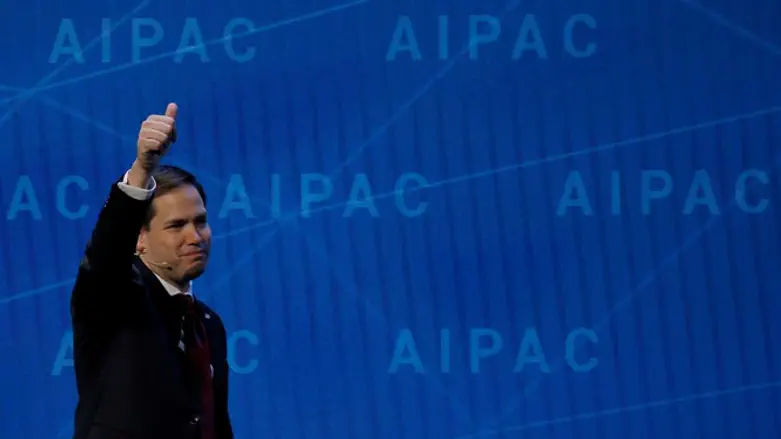
Former Republican presidential hopeful and US Senator Marco Rubio spoke at the AIPAC Policy Conference in Washington D.C. Tuesday, to explain the importance of the US-Israel relationship.
"You have a strong track record of support for Israel. Where does that passion come from?", Rubio was asked.
"Three things I think I've always pointed to; the first is I think America should be a friend of our friends, and certainly standing with our allies is important. Israel is the strongest ally we have in the region and one of the strongest in the world.
"The second is I think Israel stands for everything we hope the Middle East will become: A free-enterprise democracy that's pro-American - if we had more countries like that in the Middle East our lives would be a lot simpler.
"And then the third is that Israel has a unique purpose. Unlike any other nation on Earth it was created for a very specific purpose in the aftermath of the Holocaust to ensure there would never again not be a homeland for the Jewish people and an ability to defend themselves when anti-Semitism turns into violence."
Rubio spoke about the expanding Iranian hegemony in the Middle East: "They're trying to drive us out of the region, and they are doing that through a combination of Shia militias and partnering with different countries. You see them trying to use the Kurdish situation in Iraq to their advantage. You see them reaching out to the Turks. You see them, obviously, supporting Assad and the work they do with Hezbollah. They're taking advantage of the Gulf rift. So it's a strategic effort on their part to drive the United States out of the region and become the predominant regional power.
"So every single one of those issues are the ones we have to confront. We cannot be pushed out of the Iraqi conversation. We cannot be pushed out of the Syrian solution and whatever ultimately happens there with stability. And then of course it's important for us to make clear to the world that our relationship with Israel is not just symbolic, it doesn't end with the move of an embassy which we've all supported. It includes the very clear notion that the United States will support Israel militarily, financially, economically to make sure they can withstand anything that comes their way as you see Hezbollah develop these capabilities in Lebanon - that are greater than they have ever been in terms of the ability to hit Israel."
Rubio says that work must be done on Capitol Hill to assure all his colleagues are aware of these realities: "All these issues are interlinked. Iran's efforts in Iraq are ultimately tied to their ability to encircle and eventually directly threaten Israel, be it through proxies or directly. And I think we need to do more work on that front. We can't just view the Iranian issue in isolation, we have to understand that their ultimate goal is domination of the region and that includes going right after Israel, even if it's using Hezbollah out of Lebanon, or increasingly Syria. So we need to tie those things together; they are interrelated."
Regarding legislation he is cosponsoring with U.S. Senator Christopher Coons of Delaware (D), calling for security assistance and expanded US/Israel cooperation, Rubio said, "Administrations come and go. But if it's in the law and it's for the next ten years that means the next administration, whatever party that's in, six years from now, whenever that may be, is going to inherit a law that had codified the Memorandum of Understanding as a floor and makes clear to the world that the US has a legal commitment, not just a moral one, but a legal obligation to come to Israel's assistance and to continue to provide help."
Rubio updated the AIPAC audience on versions of legislation to impose sanctions on Hezbollah. "The risk that Hezbollah poses out of Lebanon is severe. Their capabilities today and what the Iranians have supplied them with allow them now to manufacture their own rockets and potentially try to overwhelm Israel's defenses at some point. So it is important that we do everything we can to cut off any financial streams that they are using to fund this activity."
Explaining his support for foreign assistance monies as an arm of US foreign policy, Rubio said: "International assistance is less than 1% of our overall budget. It is not charity. It is a direct investment in national security and strengthening institutions in partner nations and frankly it saves us money in the long term if we invest it correctly. So we're going to continue to be vigorous in support of that."